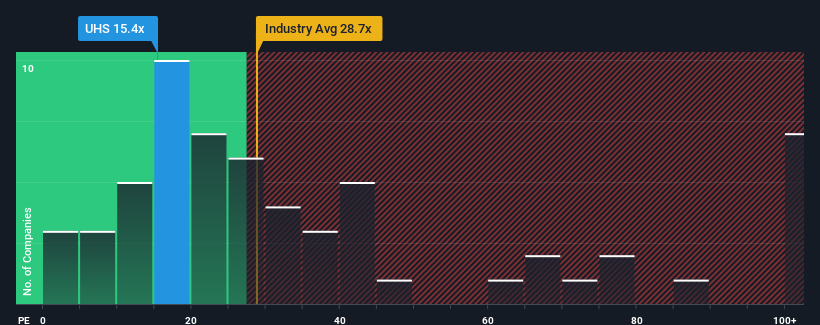- United States
- /
- Healthcare Services
- /
- NYSE:UHS
Investors Aren't Entirely Convinced By Universal Health Services, Inc.'s (NYSE:UHS) Earnings

It's not a stretch to say that Universal Health Services, Inc.'s (NYSE:UHS) price-to-earnings (or "P/E") ratio of 15.4x right now seems quite "middle-of-the-road" compared to the market in the United States, where the median P/E ratio is around 17x. Although, it's not wise to simply ignore the P/E without explanation as investors may be disregarding a distinct opportunity or a costly mistake.
Universal Health Services certainly has been doing a good job lately as its earnings growth has been positive while most other companies have been seeing their earnings go backwards. One possibility is that the P/E is moderate because investors think the company's earnings will be less resilient moving forward. If not, then existing shareholders have reason to be feeling optimistic about the future direction of the share price.
View our latest analysis for Universal Health Services

How Is Universal Health Services' Growth Trending?
In order to justify its P/E ratio, Universal Health Services would need to produce growth that's similar to the market.
Taking a look back first, we see that the company grew earnings per share by an impressive 42% last year. The latest three year period has also seen a 9.6% overall rise in EPS, aided extensively by its short-term performance. Therefore, it's fair to say the earnings growth recently has been respectable for the company.
Looking ahead now, EPS is anticipated to climb by 13% each year during the coming three years according to the analysts following the company. With the market only predicted to deliver 11% per annum, the company is positioned for a stronger earnings result.
With this information, we find it interesting that Universal Health Services is trading at a fairly similar P/E to the market. It may be that most investors aren't convinced the company can achieve future growth expectations.
The Key Takeaway
While the price-to-earnings ratio shouldn't be the defining factor in whether you buy a stock or not, it's quite a capable barometer of earnings expectations.
Our examination of Universal Health Services' analyst forecasts revealed that its superior earnings outlook isn't contributing to its P/E as much as we would have predicted. There could be some unobserved threats to earnings preventing the P/E ratio from matching the positive outlook. At least the risk of a price drop looks to be subdued, but investors seem to think future earnings could see some volatility.
Having said that, be aware Universal Health Services is showing 1 warning sign in our investment analysis, you should know about.
If P/E ratios interest you, you may wish to see this free collection of other companies with strong earnings growth and low P/E ratios.
New: AI Stock Screener & Alerts
Our new AI Stock Screener scans the market every day to uncover opportunities.
• Dividend Powerhouses (3%+ Yield)
• Undervalued Small Caps with Insider Buying
• High growth Tech and AI Companies
Or build your own from over 50 metrics.
Have feedback on this article? Concerned about the content? Get in touch with us directly. Alternatively, email editorial-team (at) simplywallst.com.
This article by Simply Wall St is general in nature. We provide commentary based on historical data and analyst forecasts only using an unbiased methodology and our articles are not intended to be financial advice. It does not constitute a recommendation to buy or sell any stock, and does not take account of your objectives, or your financial situation. We aim to bring you long-term focused analysis driven by fundamental data. Note that our analysis may not factor in the latest price-sensitive company announcements or qualitative material. Simply Wall St has no position in any stocks mentioned.
About NYSE:UHS
Universal Health Services
Through its subsidiaries, owns and operates acute care hospitals, and outpatient and behavioral health care facilities.
Solid track record and good value.
Similar Companies
Market Insights
Community Narratives



